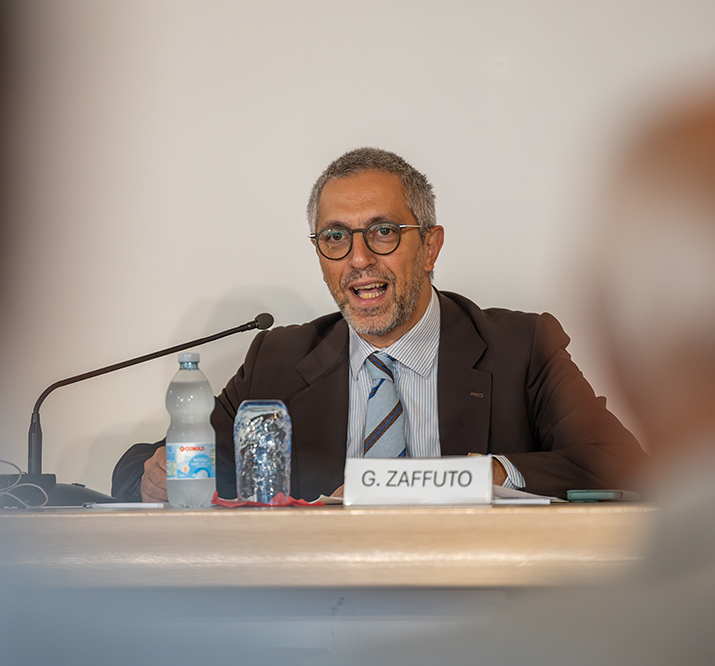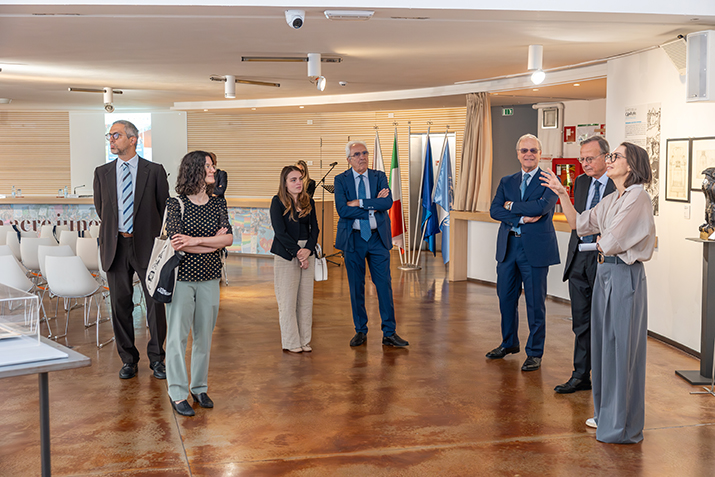SEMINAR AT THE BELL
THE PROTECTION OF HUMAN RIGHTS AND WORLD DISORDER: THE COUNCIL OF EUROPE'S RESPONSE
We celebrate Maria Dolens, the Bell of Peace, cast a century ago with bronze from the nineteen countries that fought in the First World War. I speak of celebration: a celebration of a bell that tolls for Peace, yet this bell also tolls in memory of the war and those who lost their lives in it. Apart from two periods when it had to be recast, Maria Dolens has rung at sunset, 100 chimes, every day since 1925.
If it had chimed every single day, there would have been more than three and a half million chimes. But it would take another six centuries - yes, another 600 years - before the Peace Bell had rung for every fallen soldier in the First World War. If it continues to toll for every person killed in World War II, it will ring for another twenty centuries.
And if Maria Dolens rang just once for every man, woman and child killed by all wars, this bell would ring for eternity.
What a waste.
A waste of talent and opportunity.
Of love and laughter.
Of life.
When it rings, this beautiful bell mourns the dead and warns us that Peace is fragile. Maria Dolens reminds us that we are part of a greater whole, that every death in every war echoes across the planet, touching us all.
Let me remind everyone of the beginning of the most famous poem by the English poet John Donne:
No man is an island,
entire of itself.
The First World War was to be the first and the last, the 'war that would have ended all wars'. Our soldiers were sacrificed so that no more blood would be shed. At least, that was the theory. But since then, what has happened?
Twenty years later, another world war took place, lasting six long years and killing more people than any other war in history. Was the world destined to stay trapped in this cycle of death and destruction?
While Europe was reeling, wounded and tested by the flames of war, there were many who swore that this would not happen. From the ashes, the Council of Europe was born, with the aim of uniting nations and working to maintain Peace. The Council lit a beacon of hope and, over the years, consolidated its strength as more and more Member States joined our mission of an international order based on rules. Today, the Council brings together 46 Member States with our shared values of democracy, human rights and the rule of law.
For decades we have managed - despite being shaken countless times - to preserve our fragile Peace in much of Europe. Yet, in the hundred years since the first casting of the Bell of Peace, there has never been a day when our world has not experienced war. And in 2025 we find ourselves under attack, with enemies - who may not even know that they are enemies - using every weapon at their disposal to sow mistrust and disunity. They would like to divide us, deliberately creating and feeding the rifts that the Council of Europe was created to counteract.
The countless formidable global challenges we face are being instrumentalised to become hotbeds of division and hatred. Technology and artificial intelligence are being used to generate waves of malicious disinformation, cybercrime and even cyberterrorism. Then the weakening of press freedom, gender equality and diversity are added to the list.
Climate change is causing extreme weather conditions and natural disasters, bringing tragedy, chaos and fear. Global threats to water and food security are shaking us to our core. Geopolitics is not just experiencing tremors, but veritable earthquakes - and the resulting rifts seem almost impossible to bridge.
If a clod be washed away by the sea
Europe is the less
Any attack, of any kind, on the national integrity of any of our Member States is an attack on all of us. Russia's invasion of Ukraine in February 2022 was not simply about a strip of land being dragged away, but a gigantic boulder being destroyed in the very foundations of Europe. We need those foundations. Europe must stand firm on the foundations that still support us: the shared values of democracy, human rights and the rule of law.
The Council of Europe has stood by Ukraine from the beginning of the conflict, not only because it was right to do so for Ukraine, but also because it was right to do so for Europe. For Europe and for international order based on rules.
Every man's death diminishes me for I am involved in mankind
Each of us is a citizen of a nation that is part of Europe. Just as the chimes of Maria Dolens spread throughout the valley, so too do our actions resonate throughout the world. Russia's attack on Ukraine seems to have no end. The Council of Europe has supported Ukraine since the beginning of the war. We have implemented the most ambitious action plan in history and are currently working on more than 30 projects related to resilience, recovery and reconstruction, in close cooperation with the Ukrainian authorities. On 25 June 2025, Ukrainian President Volodymyr Zelenskyy and Secretary General Alain Berset signed an agreement on the establishment of a special court for the crime of aggression against Ukraine. Accountability is fundamental in the path to justice. The same goes for the compensation and the ability of Ukrainian citizens to rebuild their lives and their country. This is why we set up the Damage Register, which has already received over 55,000 claims in the 11 categories currently open. We hope that our Complaints Commission will be operational early next year.
The Secretary-General also appointed a special envoy on the situation of children in Ukraine. The Council of Europe will continue to work for fair and lasting Peace in Ukraine. Fair and lasting Peace in Ukraine would be a new milestone in the foundations of Peace and democracy throughout Europe. Our leaders must continue to heed the bells of Peace, because none of us can afford the bitter price of war. It is up to us to create and amplify new chimes of hope. But as we listen to Maria Dolens, there is no need to wonder for whom the bell tolls. It tolls for all of us.
Bjørn Berge

Giuseppe Zaffuto reads the speech of the Deputy Secretary General of the Council of Europe, Bjørn Berge

Seminar speakers visit the Maria Dolens centenary exhibition guided by curator Chiara Moser






